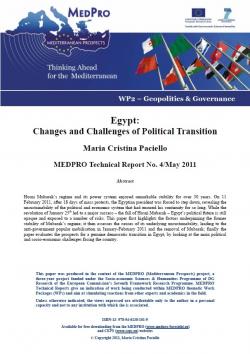Egypt: Changes and Challenges of Political Transition
Hosni Mubarak’s regime and its power system enjoyed remarkable stability for over 30 years. On 11 February 2011, however, after 18 days of mass protests, the Egyptian president was forced to step down, revealing the unsustainability of the political and economic system that had ensured his continuity for so long. While the revolution of January 25th led to a major success – the fall of Mubarak – Egypt’s political future is still opaque and exposed to a number of risks. This paper first highlights the factors underpinning the former stability of Mubarak’s regime; it then assesses the causes of its underlying unsustainability, leading to the popular anti-government mobilisation in January-February 2011 and the removal of Mubarak; finally the paper evaluates the prospects for a genuine democratic transition in Egypt, by looking at the main political and socio-economic challenges facing the country.
Documento prodotto nell'ambito del progetto MedPro (Mediterranean Prospects), finanziato dal settimo Programma quadro dell'Unione europea. Versione rivista pubblicata in: Silvia Colombo and Nathalie Tocci (eds.), The Challenges of State Sustainability in the Mediterranean, Roma, Nuova Cultura, settembre 2011, p. 101-160 (IAI Research Paper 3).
-
Dati bibliografici
Brussels, MedPro and Centre for European Policy Studies, May 2011, 34 p. (MEDPRO Technical Paper ; 4) -
ISBN/ISSN/DOI:
978-94-6138-101-9
Introduction
1. Behind the Veil of Stability of Hosni Mubarak’s Regime (1981-February 2011)
1.1 “From relative tolerance to neo-authoritarianism”
1.2 The weakness of opposition forces
1.3 Economic reforms as a tool to consolidate/restructure the regime’s power system
1.4 The role of external actors
2. Explaining the Unsustainability of Hosni Mubarak’s Regime
2.1 Rapid economic growth with no re-distribution
Diminishing purchasing power and rising income poverty
Deteriorating labour market conditions, particularly among young
The retrenchment of state welfare provision
2.2 Rapid regression in the political sphere and the emergence of a spontaneous grassroots mobilisation
3. The Challenges Ahead
3.1 The Limits of transition: The Military Council and the interim government
3.2 Restoring public security
3.3 Constitutional reform
3.4 The role of political and other civil society groups
3.5 The role of the Muslim Brothers
3.6 Socio-economic problems
4. Possible scenarios for the future
Bibliography
Tema
Tag
Contenuti collegati
-
Ricerca06/01/2014
MEDPRO - Prospective analysis for the Mediterranean region
leggi tutto




